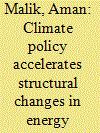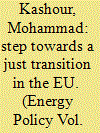|
|
|
Sort Order |
|
|
|
Items / Page
|
|
|
|
|
|
|
| Srl | Item |
| 1 |
ID:
181787


|
|
|
|
|
| Summary/Abstract |
The employment implications of decarbonizing the energy sector have received far less attention than the technology dimension of the transition, although being of critical importance to policymakers. In this work, we adapt a methodology based on employment factors to project future changes in quantity and composition of direct energy supply jobs for two scenarios - (1) relatively weak emissions reductions as pledged in the nationally determined contributions (NDC) and (2) stringent reductions compatible with the 1.5 °C target. We find that in the near-term the 1.5°C-compatible scenario results in a net increase in jobs through gains in solar and wind jobs in construction, installation, and manufacturing, despite significant losses in coal fuel supply; eventually leading to a peak in total direct energy jobs in 2025. In the long run, improvements in labour productivity lead to a decrease of total direct energy employment compared to today, however, total jobs are still higher in a 1.5 °C than in an NDC scenario. Operation and maintenance jobs dominate future jobs, replacing fuel supply jobs. The results point to the need for active policies aimed at retraining, both inside and outside the renewable energy sector, to complement climate policies within the concept of a “just transition”.
|
|
|
|
|
|
|
|
|
|
|
|
|
|
|
|
| 2 |
ID:
192792


|
|
|
|
|
| Summary/Abstract |
Policymaking increasingly targets an energy transition that is not only low cost and low carbon, but also just. While energy system models have been useful policymaking tools towards achieving the first two objectives, it is yet unclear to what extent they can also support a just transition. Here, we review 73 recent energy systems modelling studies using an analytical coding frame and observe a diversity of approaches to account for energy justice. While models do show promise in being able to support a just transition, especially in terms of assessing distributional outcomes, many of the approaches in the literature are poorly connected to current energy justice goals and discourses, decreasing the studies’ policy relevance and leaving policymakers with suboptimal planning support. Based on our results, we suggest eight actions for modellers to increase the policy relevance of their studies, which include more direct engagement with policy and research discourses, developing location-specific case studies, leveraging public participation in the modelling process, and considering asset decommissioning.
|
|
|
|
|
|
|
|
|
|
|
|
|
|
|
|
| 3 |
ID:
190610


|
|
|
|
|
| Summary/Abstract |
Despite the consensus that green taxation is an effective way to accelerate the decarbonization of economies, few countries are implementing ambitious tax reforms. This is the case of diesel for transport in Spain. The arguments against boosting the diesel tax stressed its potential adverse effects on the economy and society, accusing it of being a regressive policy. In this paper, we shed light on the distributional impact of raising the excise tax on diesel to the same level as on gasoline for final consumers in Spain and various compensation schemes jointly designed with several stakeholders. The results confirm that raising the diesel tax without offsets would have slightly regressive effects and that rural and middle-income households would bear the brunt of the increase. However, the effects become progressive when the co-designed offsetting schemes are implemented. These findings may help decision-makers in achieving a just, acceptable, and politically viable energy transition.
|
|
|
|
|
|
|
|
|
|
|
|
|
|
|
|
| 4 |
ID:
190660


|
|
|
|
|
| Summary/Abstract |
Japan has historically been a major player within the Indo-Pacific region due to its rapid post-war economic expansion, technological advancement, massive overseas development aid as well as its cultural outreach. As the Indo-Pacific today is marred with various challenges in the form of maritime and energy security, border conflicts, booming population, developing economies, and rising carbon emissions, among others. The region requires a multipolar balance of power wherein nations can lead by example and concerted action towards creating a peaceful, prosperous and sustainable future for an extensively dynamic Indo-Pacific. This paper focuses on one of the critical variables of the region, i.e., the energy sector, and attempts to place Japan’s role and contribution to the region’s ongoing energy transitions. The extent and means through which Japan can propel itself and the region towards a just transition with the help of regional and international cooperation have been analysed.
|
|
|
|
|
|
|
|
|
|
|
|
|
|
|
|
| 5 |
ID:
177163


|
|
|
|
|
| Summary/Abstract |
The decarbonisation of energy in a coal-producing country involves phasing out the coal sector and reducing employment in coal mining. Our case study of Poland reveals that in the past, half of the workers that left the mining sector failed to move to other sectors and left the labour market. This could be explained by the lower education levels of miners and lower wages in other sectors relative to mining. We use a mathematical model to demonstrate that if ex-miners fail to move to green or neutral sectors, decarbonisation involves a net loss of the labour force, regardless of the number of jobs created in the green sector. The loss of labour constitutes a macroeconomic cost that must be added to changes in energy system costs. The size of the cost does not depend on whether reduction of emissions is achieved by the substitution of coal with renewable energy sources or by an increase in energy efficiency. The size of the cost is largest when the reduction of emissions is achieved by replacing coal with imported gas. Finally, we demonstrate how costs related to the imperfect transition of labour could be taken into account in numerical general equilibrium models.
|
|
|
|
|
|
|
|
|
|
|
|
|
|
|
|
| 6 |
ID:
176739


|
|
|
|
|
| Summary/Abstract |
Spatial economic change is an energy justice issue (Bouzarovski and Simcock, 2017) - an essential consideration in how we choose to re-wire the economy for a carbon-free future. Nothing like the conscious system-wide change required has been attempted before. Rapid policy decisions risk embedding existing injustices or creating new ones unless steps are taken to ameliorate those risks. We present a model that takes a whole-system view of the UK spatial economy, examining how increasing distance costs (e.g. through fuel tax hikes) have unequal impacts on regions and sectors. The model establishes an important carbon transition policy principle: change in spatial flows of internal trade, which are certain to occur rapidly during transition, have measurable energy justice implications. Peripheral economic regions, in rural and coastal areas and many city outskirts are most vulnerable, as are petrochemical, agricultural and connected sectors. Policy must go beyond identifying places and sectors most affected: it is the connections between them that matter most. The "push" of spatially aware fiscal policy needs to be combined with the "pull" of targeted interventions designed to promote low-carbon intermediate connections. This is not only just, but would help make (potentially costly) transition more politically acceptable.
|
|
|
|
|
|
|
|
|
|
|
|
|
|
|
|
| 7 |
ID:
192820


|
|
|
|
|
| Summary/Abstract |
The conceptual and regulatory framework of the European just transition does not consider inequality in household energy consumption. This study addresses the causes of this inequality across the 27 Member States of the European Union (EU) in the period 2010–2020 to contribute to its reduction. To identify these causes, the regression-based inequality decomposition approach is used. The results show that the variation in per capita gross domestic product (GDP), which contributes 38.76% to the inequality of household energy consumption, is the main cause of this inequality. Moreover, the average contribution of GDP per capita in the inequality of household energy consumption is almost negligible in the most developed states. In contrast, it is much higher in the least developed states, suggesting that decoupling between household energy consumption and economic development has not been achieved in all Member States. To promote a just transition to climate neutrality by 2050, the energy transition framework should therefore be broadened to help the least developed states achieve decoupling and align their energy consumption with that of the most developed states.
|
|
|
|
|
|
|
|
|
|
|
|
|
|
|
|
|
|
|
|
|